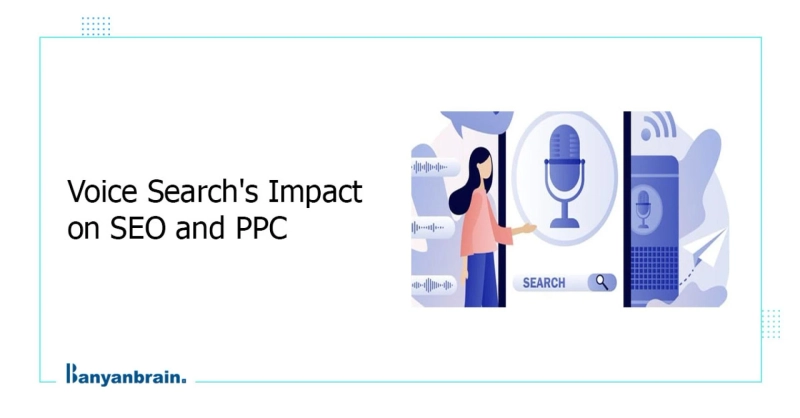Voice search is expanding as a popular form of query search where users across the globe can speak into apps, websites, or search engines instead of typing queries in the search box. Speech recognition software helps process human language into typed queries and perform research to give users desirable results. Businesses are trying to integrate voice searches into their digital marketing practices like SEO and PPC. Let us learn more about the future of voice search and how it can affect PPC and SEO in digital marketing.
What is meant by voice search?
Voice search is an advanced speech recognition technology that enables users to search on search engines using their voice instead of entering a query manually. It is a convenient and natural way for people, especially the visually impaired who cannot type, to access information, perform tasks, and interact with technology. Voice-based search allows users to interact with devices such as computers, smartphones, and smart speakers just by speaking in their natural language. Speakers can give out voice commands instead of typing their queries in search boxes. When a user initiates a voice search, the in-built speech recognition software of the device converts the user's spoken words into text. Then, it processes the text over search engines, apps, or websites to provide relevant search results or perform requested actions.
What is the impact of voice search on digital marketing?
Digital marketing practices are performed over business websites to optimize them, improve brand visibility, increase lead generation, and enhance conversion rates. With its growing popularity, the future of voice search is to lead businesses and website owners to optimize their online content and websites for voice search queries to accommodate voice search options. This affects digital marketing strategies immensely. It has become crucial for digital marketers to consider natural language processing (NLP) to improve rankings concerning voice searches.
Voice search will weigh more towards featured snippets; therefore, marketing agencies must be cautious about optimizing their website content to rank for featured snippets.With voice search, the competition for "position zero" ranking will increase as featured snippets are introduced.
The emphasis on semantic searches, including long tail keywords, will increase. Since users are most likely to search in a conversational tone, the keyword optimization will change.
How does voice search impact SEO?
Search engine optimization aims to optimize content, including information, graphics, and website ranking on SERP. Voice search changes how people search for information online, affecting the content type that search engines prioritize. These are a few ways in which voice search affects SEO.
Keyword optimization- SEO primarily rests on optimizing the website based on keywords. In typed-text-based queries, short phrases are used as keywords that target the website content. In voice-based searches, SEO needs to optimize for long-tail keywords and phrases that mimic the natural language of speakers in their everyday conversation.Position zero ranking- Voice search software often pulls answers to user queries from featured snippets that rank at "position zero" in search engine results pages (SERPs). Therefore, the shift in focus of SEO efforts is now on optimizing content to appear in these featured snippet positions. When ranking at position zero, the websites are more likely to be read out as answers to voice queries.
Local SEO- Voice searches have significantly increased the importance of local SEO as the user searches frequently involve queries related to local businesses and services. For example- "find a coffee shop near me" or "What are the operating hours of a nearby food outlet?". Local SEO has grown to become more crucial for businesses. SEO specialists must optimize the client's online presence to appear in local voice search results.
Mobile optimization- Many voice searches are often performed on mobile devices; therefore, SEO efforts must be diverted towards prioritizing mobile optimization. In this, businesses must ensure that their websites are mobile-friendly, have a quick website loading speed, and provide a seamless user experience on smartphones and tablets.
How does voice search benefit PPC?
Pay-per-click is a digital marketing strategy for increasing website traffic by running ad campaigns across various digital channels. It is a form of paid marketing where businesses can invest according to their budget. Voice search impacts pay-per-click (PPC) advertising and how advertisers create, manage, and optimize PPC campaigns.
Keyword selection- Most queries asked through voice searches are question-based and long-tailed. Therefore, PPC advertisers must include question keywords and provide direct answers in ad copy wherever relevant.Creating optimized ad copies- Advertisers should aim to create ad copies that are more conversational and semantically match the language of voice search queries that users are most likely to search. Natural language ad copies are highly beneficial.
Geotargeting- Local search queries can be catered to by ensuring the placement of accurate location and contact information for local businesses in ad campaigns. It is crucial in meeting the demands of local voice searches.
Rise in competition- As the popularity of voice-targeted searches grows, competition for voice-related keywords and phrases will multiply. Advertisers must be prepared to manage their bids and budgets effectively.
The future of voice search can be seen as improving user experience and changing how digital marketers implement SEO and PPC.
Banayabrain Digital Pvt. Ltd. offers digital marketing solutions in India and globally. Our team is skilled at SEO and PPC advertising and customises strategies based on the client's business objective.


